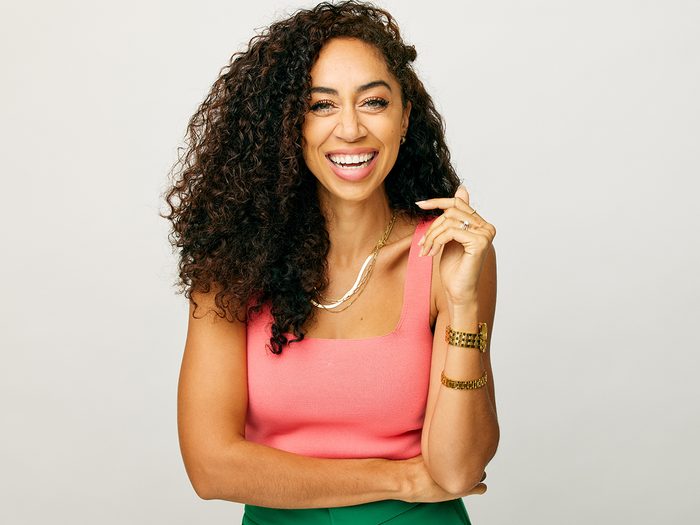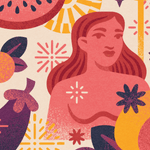Sex Expert Shan Boody on Why People Aren’t Having Sex Anymore

We’re having half as much sex as the last generation did—but according to Boodram, that’s not necessarily a bad thing.
What does a Canadian’s sex life actually look like? “Nothing like you’d expect,” says Shan Boodram (known as Shan Boody by her fans), host of the new CBC show The Big Sex Talk.
And she would know: Boodram’s a sex expert and dating coach, dishing out necessary intel and advice through a best-selling book, highly rated podcast and fan-favourite Youtube channel (just ask any of her nearly 700k subscribers). She’s also hosted three sex and dating shows, with her latest creating a fresh dialogue about what Canadian sexuality is really like today. In a word? “Diverse,” Boodram says.
The Big Sex Talk covers hot topics discussed by a range of speakers who open up about their personal experiences and preferences. “It’s what I love about the series,” she says. “Canadians sharing their struggles, their vulnerabilities—that’s going to give you more of an understanding about sex than any expert or textbook ever could.”
Each of the show’s six episodes delves into the kinds of topics you’ve probably discussed with friends in a group chat or maybe, opened up an incognito window and ran through a Google search. For example: Why do we act like monogamy makes sense for everyone? How does tech—from dating apps to VR porn—impact our sex lives? Is there a “sexpiration” date, or is it possible to still be in the mood at age 90?
One recurring theme is our lack of sexual desire. In an episode called “Not Having It,” Boodram says that North Americans today are having sex half as often as the last generation—and this includes people under 30, too.
What happened to our friskiness? Where did all the lust go? And should we be concerned? We hopped on a call with Boodram to get her thoughts.
The episode “Not Having It” includes a range of people who aren’t having sex for various reasons. Why do you think we aren’t having as much sex as we used to?
Technology has drastically changed the way we interact, and in many cases, it has decreased our motivation to have in-person connections, whether that’s sex or just going out for coffee with a friend. Add a pandemic, and there’s even less incentive for us to actually have these in-person moments and connections.
That’s one side. The other side is maybe the decrease in sexual desire isn’t a bad thing. Now we have more people who are not succumbing to coercion because they understand the power of consent, and they understand the right to advocate for their body. And more people are saying no to the kind of sex we traditionally define as sex. They’re finding other ways to experience pleasure on their own terms. There are some communities, like under the asexual umbrella, which is looked at in this episode, in which no sex is an expression of their sexuality.
Right! We saw two women who identified themselves as “prudes,” and challenged the stigma around choosing to be celibate—but that may not be easy for some people to do. What advice do you have for someone who may feel unsure how to handle being asexual or having a low sex drive, and have difficulty navigating the dating world?
If you don’t feel confident, if you feel unsure, if you have questions, seek out a community, seek out the experts, seek out the workshops that can help. The amazing thing the pandemic has done is create this self-education boom with workshops and classes you can sign up for. Invest your time in people who have figured it out—whether that be having a sex-free relationship or boosting a low sex drive—learn from them and then see how those teachings can apply to your life.
Where do you think our need for in-person connection has gone?
There’s no one-size-fits-all answer for something so diverse—and it could actually be more harmful to try to give just one answer. For example, we’ve seen a rise in the usage of antidepressants, which could be a positive thing, because more people are seeking out help, but maybe that’s also an indicator of how our lack of touch and connection has affected our mental health. However, to say lack of touch is leading to higher rates of depression is only telling a part of the story. Everyone needs to analyze their own behaviour and ask, Is there a relationship between how little human interaction I have and how sad I am feeling? Or maybe: Is there a relationship between not having as much human contact and feeling more safe and more empowered?
Have you noticed a lack of dating as well? Could that be the reason we’re having less sex?
I’m also Bumble’s sex and relationship advisor, so I have the benefit of having access to their stats, and the trend coming out of a pandemic is “intentionality”: people being specific about what they’re looking for. There’s something called being “consciously single,” which is the idea that someone isn’t single by default, because they can’t find anybody, but because this is what wellness looks like for them. There are also people who are prioritizing different types of connections, such as business ones.
The pandemic has had a huge impact on people’s dating life. A study of the past two years showed 25 percent of women haven’t had one sexual partner, which obviously speaks to the fact that we’ve been encouraged to stay away from each other. But as things start to open back up, I think the new normal will be more intentionality.
What about the people who want to want more sex—do you have any tips for reigniting their sex drive?
First, assess if your low sex drive is frustrating you or not. Some people feel we’re supposed to hit this number, like having sex a certain amount of times per week, in order to be sexual beings, but it’s also okay if you’re just in a space where that’s not important to you.
If it is frustrating you and negatively impacting your sex life, nothing can replace having a conversation with the people you’re sexual with or want to be sexual with. Often their thoughts about why you have less sex are different from what your reality is, and that can take pressure off.
Also, understand that after we get through that honeymoon phase in a relationship, you have to be more intentional about getting into that space where sex or connection is possible. Know your turn-on triggers and love language, and understand not everybody is going to get there the exact same way—and be curious about your partners’ turn-ons, so you can be on the same page.
This interview has been edited and condensed for clarity.
The Big Sex Talk is streaming on the free CBC Gem streaming service.
Next: You Know Your Love Language—How About Your Sex Language?




